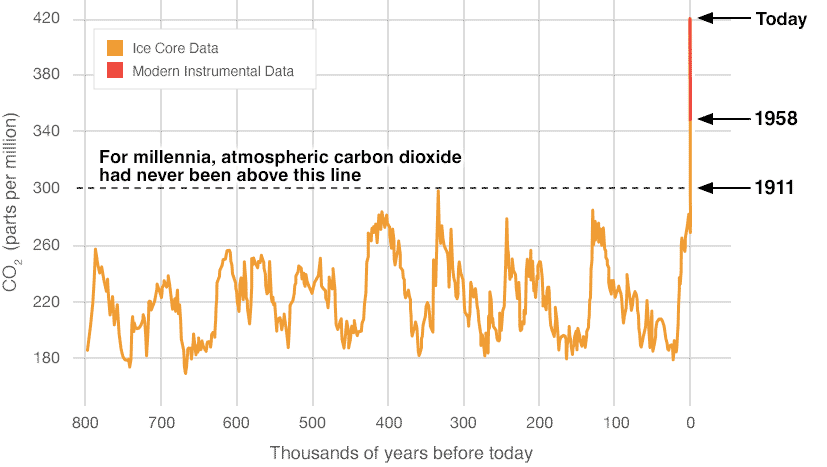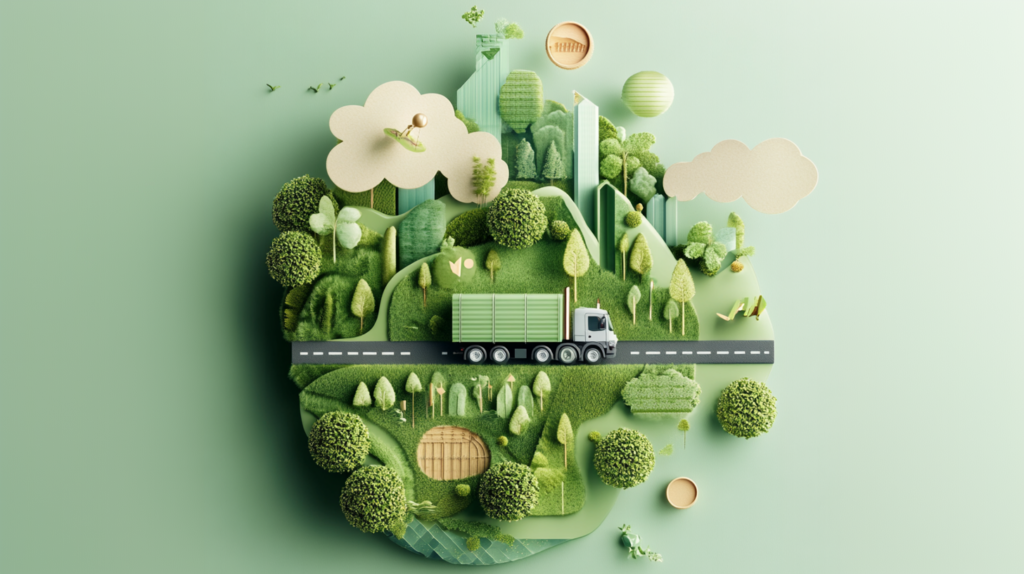Sustainable Trends in Logistics
A company that values itself seeks to belong to an environment that is doing something for a sustainable future. In this article, INCON-LOGISTIC Kft. presents the top 6 sustainability trends, and as an interesting addition, you can also read about packaging-free products. Have you ever wondered why this effort is so important for all of us?
“The atmospheric concentration of carbon dioxide is currently around 420 ppm (parts per million), well above the pre-industrial level of 280 ppm. The scientific consensus indicates that exceeding the 450 ppm threshold could initiate serious positive feedback processes, putting the Paris Agreement’s goal of limiting global warming to 1.5 °C in question. With an annual increase of 2.4 to 3 ppm, the 450 ppm threshold could be reached as early as the early 2030s if we do not reduce emissions.” – This can be read in one of the articles by Sustainable Progress.
This data sounds alarming, and unfortunately, it is! Carbon dioxide (CO2) is a greenhouse gas (also known as a heat-trapping gas) that originates from the extraction and burning of fossil fuels such as coal, oil, and natural gas. The graph clearly shows that the amount of CO2 entering the atmosphere has surged with the rise of industrial activity, reaching levels never seen before.

What Can the Transportation Industry Do About This?
Transportation, freight, and logistics are essential for us. Today’s economy cannot be imagined without the international transport of goods and people. Industrial production would decline, entire industries would come to a halt, and millions would be left without jobs. Therefore, the answer to reversing climate change is not to stop transportation. So, what is it? Sustainable transportation! As the problems of global warming and environmental pollution become increasingly urgent, companies need new strategies to adapt to the new reality. Commitment to sustainable development is not just a trend; it is a fundamental first step towards long-term success.
The INCON team has identified 6 important trends that play a significant role in the development of companies and their sustainability efforts in the current economic environment.
Trend 1: Decarbonization
Decarbonization refers to the steps a business can take to reduce its carbon dioxide emissions. Currently, the transportation and logistics sector accounts for approximately 24% of global carbon dioxide equivalent (CO2e) emissions, indicating that there is much work to be done.
According to the IPCC (Intergovernmental Panel on Climate Change) 2021 report, a dramatic reduction in greenhouse gas emissions is essential to limit global warming to 1.5 °C over the coming decades. For companies, taking steps towards sustainability, such as using renewable energy sources and implementing more efficient logistics solutions, is not only beneficial from an environmental perspective but can also lead to long-term cost savings. The Intergovernmental Panel on Climate Change suggests that decarbonizing the global economy could result in annual savings of $1-2 trillion if companies adapt to new sustainable practices.
Trend 2: Green Energy Solutions
Green energy solutions play a key role in decarbonization strategies. The good news is that by 2023, over 30% of global electricity generation comes from renewable sources. Businesses should consider switching to green energy providers that generate electricity from renewable sources such as hydro and wind energy. If a company operates from its own premises, installing solar panels can provide clean, carbon-free electricity.
It’s important for companies to research various energy grants that can assist in implementing solutions like installing electric vehicle charging points. Additionally, a simple yet effective step for energy savings is to ensure that all equipment is turned off at night or when not in use.
Trend 3: Artificial Intelligence Innovations
Artificial intelligence (AI) plays a crucial role in helping companies make their logistics processes more sustainable. Key areas of AI application include demand forecasting and route optimization. In demand forecasting, AI-supported inventory management software can analyze customer data and market trends, assisting businesses in predicting necessary stock levels. This reduction in excess inventory allows for optimal use of storage space.
Route optimization also plays an important role, especially when multiple deliveries are being made daily. With AI’s assistance, one can identify the most efficient routes by considering distance, real-time traffic data, vehicle capacity, and delivery time windows. This not only contributes to reducing vehicle fuel emissions but also maintains customer satisfaction.
Trend 4: Sustainability Initiatives in Reverse Logistics
Reverse logistics refers to the “upstream” flow of products through the supply chain, allowing goods to be returned from the end-user to a retailer or manufacturer (for example, in the form of product returns). This approach embraces the circular economy model, extending the lifecycle of old or damaged products through reprocessing, repurposing, repairing, and reselling.
Fashion brand H&M is an excellent example of how to implement an innovative reverse logistics strategy. Their Garment Collecting program allows customers to drop off unwanted clothing of any brand at one of their stores. These collected garments are either resold as second-hand items, transformed into new collections, or shredded into textile fibers to create other products.
This approach helps reduce waste generation and extends the lifecycle of products. Initiatives in reverse logistics are vital pillars in realizing a circular economy.
Trend 5: Sustainable Packaging Solutions
Environmentally conscious consumers are increasingly paying attention to how products are packaged. Plastic is becoming a no-go zone, and excessive or unnecessary packaging can also harm a brand’s reputation. However, there’s good news for businesses! There has never been a wider range of innovative, eco-friendly packaging solutions available than there is today. This includes compostable packaging and materials made from seaweed!
The trend towards sustainable packaging is becoming increasingly important. In 2021, the global sustainable packaging market was expected to be valued at $400 billion, and this figure could grow to $600 billion by 2026. Therefore, businesses need to adapt to consumer demands and environmental expectations. Consumer research supports this trend: according to a 2019 Nielsen survey, 73% of respondents are willing to pay more for sustainable packaging. Additionally, according to a report from TerraCycle, companies that offer thoughtful packaging solutions experience higher customer satisfaction and loyalty. Sustainable packaging is not just a market trend; it is evolving into a long-term strategy that can enhance companies’ competitiveness.
TREND 6: Collaboration Within the Supply Chain
The final trend we highlight is the importance of collaboration. Companies can jointly share their resources, such as transportation capacities and storage facilities, which reduces the number of vehicles on the roads and lowers fuel consumption. Additionally, they can implement joint sustainability initiatives, such as using green energy and introducing eco-friendly packaging solutions.
Through collaboration, companies can share experiences, allowing for faster integration of more sustainable solutions. It also provides opportunities to select sustainable suppliers, thereby strengthening the sustainability chain.
Packaging-Free Products
“By 2050, there is expected to be more plastic in the oceans than fish, making it more crucial than ever to strive for a plastic-free lifestyle.”
Shocking, isn’t it? Now let’s explore where this trend originated and why it is beneficial. The trend can be attributed to the Canadian retail chain Bulk Barn, which was the first to open a packaging-free store in 1982. Today, they operate more than 250 locations with over 4,000 products. However, it took 25 years for this trend to reach Europe. In 2007, Unpackaged became the first European company to open a packaging-free grocery store in London. In Hungary, the first such shop and café was NoPack, opened in 2015.
How do packaging-free supermarkets attract customers?
A study by Price, Waterhouse & Co. (PwC) titled “Packaging-free food – niche or trend?” looked into how packaging-free supermarkets attract customers. The survey revealed that a significant portion of respondents view packaging-free shopping positively. According to the survey:
- 82% are willing to buy packaging-free food.
- 63% would like to see more such products in traditional supermarkets.
- 35% would prefer to shop at packaging-free stores.
- 18% cannot imagine giving up packaging.
In Hungary, you can already shop packaging-free in many places, including large hypermarkets, where most vegetables, fruits, or nuts can be taken in containers you bring yourself. But it’s not just food that can be packaging-free! In terms of packaging-free cosmetics, brands like Lush and Ethique are popular choices in Hungary. Both emphasize sustainability and eco-friendly solutions. While precise figures are constantly changing, recent trends indicate that more people are starting to use their own containers during shopping, especially with the growing awareness of environmental issues. Some surveys suggest that a significant number of shoppers, ranging between 30-50%, regularly bring their own bags or containers. How do you usually shop, and what influences your choices?
How Does INCON Keep the Earth Alive?
INCON-LOGISTIC Kft. prioritizes everything that contributes to the protection of our planet, as we are aware of the significant harm our industry can cause. Unfortunately, this is a pressing issue that we must address rather than sweep under the rug. Our goal is to actively participate in the spread of decarbonization and green energy solutions, as well as in the application of artificial intelligence, all of which contribute to more efficient and sustainable logistics systems.
We believe that reverse logistics initiatives and sustainable packaging solutions not only provide a competitive advantage but also reflect our corporate social responsibility.
We look forward to working with our partners and clients to achieve sustainability goals and are ready to face every challenge necessary for creating a green future! INCON’s aim is to become a champion of sustainable development and contribute to building a cleaner and better world!
Do you usually carry your own bags when shopping? What do you commonly use them for? We eagerly await your responses in the comments or at info@incon-logistic.hu!
SOURCES:
https://www.fenntarthatofejloves.net/2022/09/19/geo-eghajlatvedelmi-vilagnap/
https://www.dhl.com/discover/en-us/global-logistics-advice/sustainability-and-green-logistics/sustainability-trends-in-logistics
https://climate.nasa.gov/vital-signs/carbon-dioxide/?intent=121#:~:text=Since%20the%20onset%20of%20industrial,ice%20age%2020%2C000%20years%20ago.
https://www.terracycle.com/en-US
https://www.lead-innovation.com/en/insights/english-blog/packaging-free-supermarket
https://karmanzoldkor.home.blog/2020/11/14/a-csomagolasmentes-boltok-rovid-tortenete/
https://www.lush.com/uk/en/a/packaging-free-cosmetics

